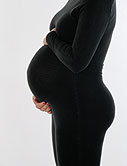
THURSDAY, March 28 (HealthDay News) — Although rare in the United States, three babies with birth defects caused by rubella (or “German measles”) were reported in 2012 and doctors need to be on the lookout for such cases, a new government report indicates.
Birth defects caused by what doctors call “congenital rubella syndrome” can include cataracts, hearing problems and heart abnormalities. The syndrome occurs when a pregnant woman is infected with rubella and passes it to her fetus.
More than 90 percent of people in the United States have been vaccinated against rubella or have natural immunity, which means that congenital rubella syndrome is extremely rare in the nation.
But last year, three cases of the syndrome were reported in Alabama, Illinois and Maryland. In all three cases, the mothers did not have documentation of rubella vaccination, were born in another country, became pregnant and were likely infected in Africa, the report said.
The infants were born with brain malformations, heart defects, cataracts, hearing problems, blood disorders and inflammation of lung tissue (pneumonitis). One of the babies died due to the syndrome.
Even though congenital rubella syndrome is rare in the United States, health care providers and public health officials “should maintain a high level of suspicion” if they encounter children who have birth defects compatible with the syndrome who were born to mothers who spent time during their pregnancy in countries where rubella is endemic, the researchers said in a news release from the U.S. Centers for Disease Control and Prevention.
One expert noted that infection is most dangerous early in the pregnancy.
“The most severe manifestations occur when the maternal infection is in the first trimester,” said Dr. Martin Chavez, director of maternal fetal medicine in the department of obstetrics & gynecology at Winthrop University Hospital, in Mineola, N.Y. “These can include blindness, neurological damage and/or heart defects.”
“While we are fortunate in the United States that most individuals have been vaccinated and are immune, health care providers that serve foreign-born populations must be aware that other countries may have much lower immunity rates,” Chavez added. “Efforts should be made to document or verify the immune status of all reproductive-age women.”
The report, by Kurt Setoo of the Maryland Department of Health and Mental Hygiene, and colleagues there and elsewhere, is published in the March 28 issue of the CDC’s Morbidity and Mortality and Weekly Report.
More information
The March of Dimes has more about rubella and pregnancy.

